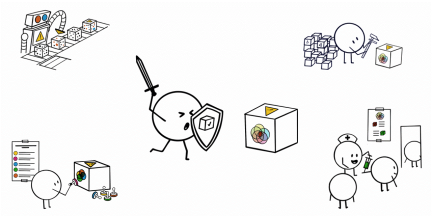On the occasion of the 2019 European elections and ahead of France’s 2022 presidential elections, the French Ministry of Foreign Affairs launched in 2019 a toolbox of open source software and open resources to fight disinformation. As of December 2021, Internet users can access software to detect fake Twitter accounts, assess the legality of political advertisement on Facebook, and use multiple further resources on good practices to counter disinformation. Further work is ongoing to develop and deploy additional online resources.

Fake news, disinformation, misinformation: in the past decade, the manipulation of publicly available information on online platforms and social media soared tremendously in Europe and beyond. In 2018, 83% of respondents to a Eurobarometer survey indicated that fake news represent a danger to democracy. This phenomenonhas already been witnessed in some EU countries during election times. For example, the 2017 French presidential campaign saw the leak of over 20,000 emails and false documents related to the then-candidate Emmanuel Macron.
To counter the spread of disinformation and equip citizens and companies with tools to detect it, the French Ministry of Foreign Affairs developed the Disinfo toolbox. Available on GitHub, the toolbox includes different pieces of software and online resources published under an EUPL 1.2 or a Creative Commons licence:
- Disenclopedia is an online and collaborative encyclopaedia, published under a Creative Commons BY SA licence, gathering good practices regarding the detection, prevention and countering of disinformation, as well as fact-checking techniques.
- The Bot Finder is a machine learning-based classifier that detects Twitter bot accounts. Disinfo also offers a detector of dormant Twitter accounts, called Botometer. To date, Botometer has identified more than 560,000 fake Twitter accounts, with an accuracy rate between 82% and 87%.
- A Facebook API-based detector assessing the legality of political advertisement on digital platforms. The Ministry of Foreign Affairs also makes available all the advertisement collected through the software for each EU country in the form of data sets in JSON format.
- The Open Terms Archive (OTA) platform aggregates more than 600 contractual documents (e.g. Terms of Service, Privacy policy, Terms of Use) from a large number of online platforms and service providers. Users can consult and be notified of any changes of their online services’ terms and conditions. The Scripta Manent is an online tool, complementary of the OTA platform and its API, that compares two versions of the same contractual documents.
- Media scale is an API to compare an article's visibility on social media to other known events’ visibility in its local reference media, to give some perspective to the number of reactions. The quantitative data of impressions and reactions around a piece of online content is both contextualised and put into perspective, in a clear and accessible way.
The French government is intensifying its efforts as the presidential elections approach. In July 2021, Viginum, a new Agency for vigilance and protection against foreign digital interference, was created. Under the responsibility of the Prime Minister, Viginum is in charge of detecting and analysing the propagation of hostile content on digital platforms. The Disinfo toolbox marks the beginning of the open source response to disinformation in an effort to foster transparency and reusability.
Sources:

